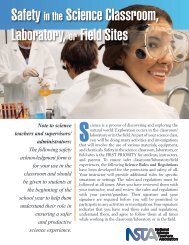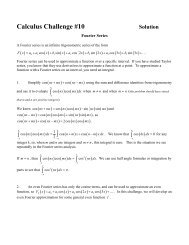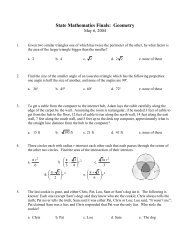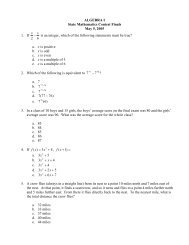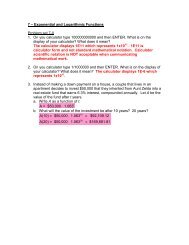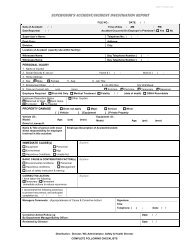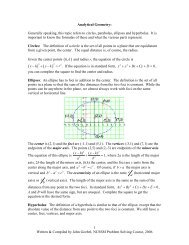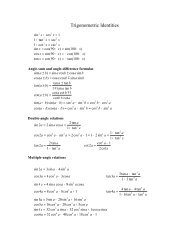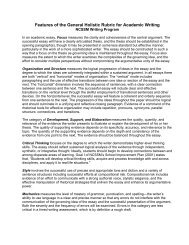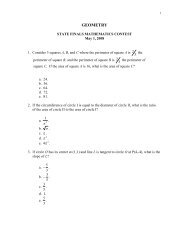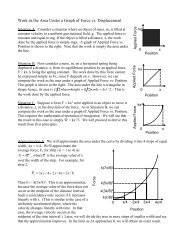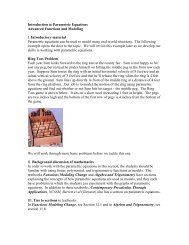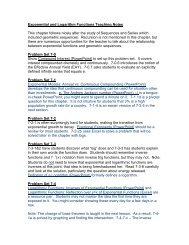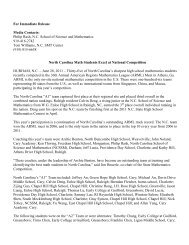NCSSM COURSE CAtAlOG - North Carolina School of Science and ...
NCSSM COURSE CAtAlOG - North Carolina School of Science and ...
NCSSM COURSE CAtAlOG - North Carolina School of Science and ...
You also want an ePaper? Increase the reach of your titles
YUMPU automatically turns print PDFs into web optimized ePapers that Google loves.
construct a comprehensive underst<strong>and</strong>ing <strong>of</strong> this historical period <strong>and</strong> its lasting<br />
significance. The cultural significance <strong>of</strong> topics such as the Brooklyn Bridge,<br />
Frank Lloyd Wright, Albert Einstein, the Arts <strong>and</strong> Crafts movement, the birth <strong>of</strong> the<br />
skyscraper, automation, the atomic age, the digital age, <strong>and</strong> Postmodernism<br />
show the relationship between diverse modes <strong>of</strong> expression <strong>and</strong> demonstrate<br />
how innovations in science <strong>and</strong> technology affect the ways reality is perceived<br />
<strong>and</strong> depicted. Assessments for the course are essay-based <strong>and</strong> project-based<br />
<strong>and</strong> are designed to allow students to develop <strong>and</strong> demonstrate their analytical<br />
reasoning critical thinking skills <strong>and</strong> ability to communicate ideas in multiple<br />
modes <strong>of</strong> discourse.<br />
IE358 Phenomenology: Husserl, Cantor, Jung<br />
One trimester<br />
Credit: One unit core elective credit.<br />
Meeting pattern: Three periods per week including lab.<br />
What is awareness? How is dreaming different from ordinary awareness? What<br />
does mathematics have to do with awareness? Are different kinds <strong>of</strong> awareness<br />
related? In this course, students explore these <strong>and</strong> other questions as they<br />
engage in a seminar-style study <strong>of</strong> what is commonly spoken <strong>of</strong> as “mind, soul,<br />
spirit, or consciousness” – not as a biochemical product or metaphysical<br />
construct but rather as experienced in the moments <strong>of</strong> lived time. Through<br />
reading, reflection, class discussion, <strong>and</strong> writing short papers, students develop<br />
an underst<strong>and</strong>ing <strong>of</strong> awareness as it is lived now in moments <strong>of</strong> a transfinite<br />
continuum. Readings include The Phenomena <strong>of</strong> Awareness: Husserl, Cantor,<br />
Jung by C. Tougas (Routledge: 2012) <strong>and</strong> selections from Plato, Aristotle, Saint<br />
Augustine, Immanuel Kant, Søren Kierkegaard, Edmund Husserl, Edith Stein,<br />
Albert Camus, Georg Cantor, <strong>and</strong> C. G. Jung.<br />
IE360 Global Underst<strong>and</strong>ing<br />
One trimester<br />
Credit: One unit core elective credit.<br />
Prerequisite: Completion <strong>of</strong> at least two trimesters <strong>of</strong> AS303 Writing <strong>and</strong><br />
American Studies or AS305 American Studies.<br />
Meeting Pattern: Four periods per week including lab. Since meetings <strong>of</strong> this<br />
course must be coordinated with schools in other countries, the meeting pattern<br />
may include one or more weekly evening class meetings, to be announced<br />
prior to registration.<br />
In this course, designed to bring a global experience to <strong>NCSSM</strong> students, we<br />
develop <strong>and</strong> foster cross-cultural underst<strong>and</strong>ing in partnership with students in<br />
other parts <strong>of</strong> the world. Through a shared virtual classroom, we explore our<br />
cultural differences <strong>and</strong> similarities in dialogue with students <strong>and</strong> faculty at<br />
schools in countries other than the United States. We engage in discussions<br />
93



